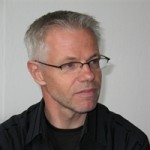Wageningen UR presents itself at COP21
This morning, Wageningen UR presented itself at the Dutch Climate House at COP21. Unfortunately, our Chair of the Board of Directors, Louise Fresco, who was supposed to open and introduce the meeting, could not make it, due to severe delays of the Thalys between Brussels and Paris yesterday. All the other speakers were present, fortunately, but some suffered from local delays as well. The metro in Paris is superfast and convenient, but the bus shuttle between the metro station Le Bourget and the COP21 venue is a disaster. It is not far, but all traffic is jammed on just 1 Kilometre of road during rush hour. I got up this morning at 6 am, just had a very quick breakfast, and still arrived at the Dutch climate House not before 9.30 am. Enfin…
I guess Wageningen presented itself well at COP21. We introduced the Wageningen Climate Statement, that sees climate change not just as an environmental problem, but as a development and governance challenge, including food security, higher agricultural production levels, resource efficiency and sustainability (people, profit, planning). In climate research and policy advise, Wageningen focuses on three domains: climate-smart agriculture, soils and forests. Madeleine van Mansfeld gave a presentation on CSA and the initiative of the CSA booster, to bring newest technologies and producers together. Jan Peter Lesschen spoke about the role of soils in the climate balance. He is enthusiastic about the French 4 ‰ initiative to increase the organic matter in the soil and thus enhance the soil’s capacity to sequestrate carbon. Jessica de Koning introduced REDD+ and the huge potential it has in the Tropics. Good news is that those countries with the largest sizes of forests, like Brazil and Indonesia, all included REDD+ in their INDCs (Intended Nationally Determined Contributions). These INDCs will be part of the Paris Agreement within 2 weeks (if it not fails, of course).
Gert-Jan Nabuurs gave a talk about European forests and showed that better management of these resources already substantially contributes to Europe’s climate commitments. This is often forgotten, with all focus on REDD+ and the Tropics, but climate gains are also to be realized in our own continent’s forests. Finally, I presented some of Wageningen’s climate policy research, that focuses, amongst others, on countries’ institutional capacities to design more effective policies and on the science-policy interface. The latter is in need of new innovative approaches, because climate change is not about ‘bringing truth to power’, but about ‘discussing uncertainties with power’. ‘Serious game playing’ by scientist and policy makers is one way of doing so.
The Wageningen presentation was however quite early in the morning (10 am). Taking into account the traffic jams on top of that, it is no surprise that the audience was not overwhelming, to say the least. Fortunately, I met two Dutch, non-Wageningen colleagues earlier in the metro this morning and they substantially enlarged the crowd after that I had told them about the Wageningen event. It has been well documented, by the way. A French photographer was hired and he took 100s of pictures. To be shared with you soon, I guess.
In an hour, I have an interview with Dutch radio NTR for a program on science and knowledge. It wants to know more about the backgrounds of UNFCCC, the nature of the Kyoto Protocol and the expectations for Paris. Since my last COP was twenty years ago, COP1 in Berlin in 1995, I guess I can particularly address the first topics. But of course, I have my ideas about the Paris event as well.
This was my last blog in this series. I will leave Paris tonight. My colleague Jessica de Koning will take over.
Au revoir….
Bas Arts is professor Forest and Nature Management at Wageningen University. During COP21 he is sharing his impressions of the conference and the events around it on this blog.

